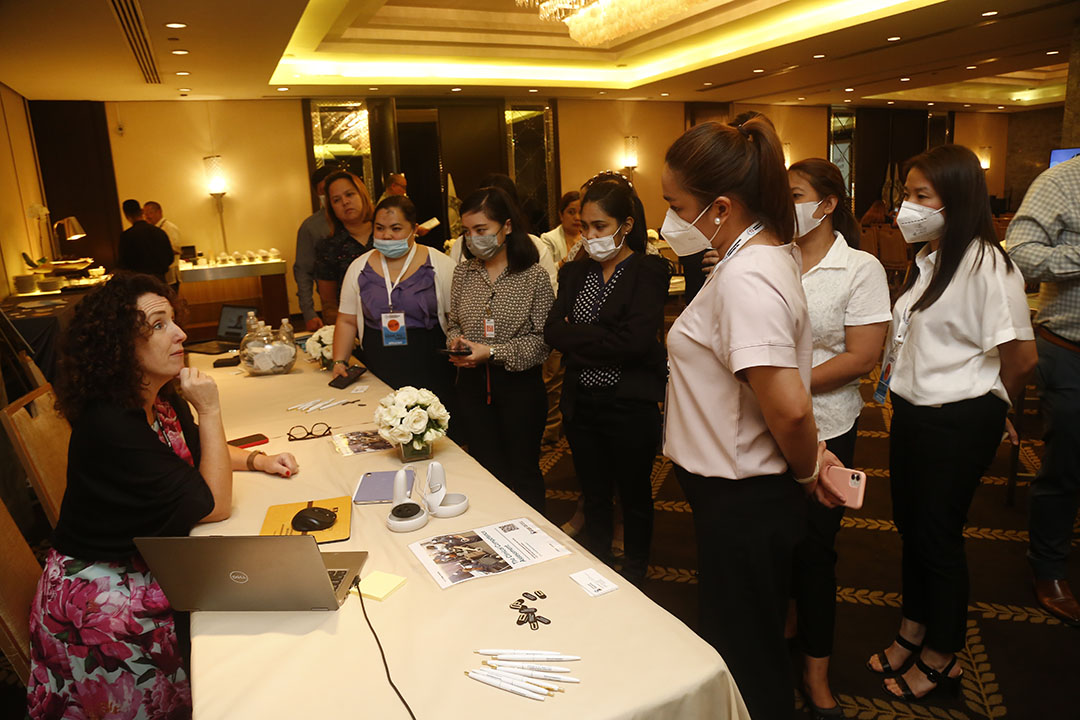
Kim Workum (seated) speaks to a group of trained nurses in the Philippines.
Assessment program being streamlined for international nurses
The College of Nursing was invited to join a Manitoba government delegation to the Philippines recently to recruit trained nurses to work in Manitoba and help address the province’s nursing shortage.
Kimberly Workum, a senior instructor in the College of Nursing, Rady Faculty of Health Sciences, represented the college on the five-day trip, which resulted in letters of interest to 190 registered nurses and 50 licensed practical nurses, as well as over 100 health care aides.
Nurses trained outside of Canada are required to complete a clinical competency assessment (CCA) before they can be licensed to work in the province.
The CCA is a diagnostic competency-based assessment that determines the candidate’s level of skills, knowledge and judgement and compares that to entry-level nurses graduating from Manitoba programs. Following the assessment, the College of Registered Nurses of Manitoba guides the nurse on the steps to take to address these gaps in order to practice safely within the Manitoba health-care system.
Workum, director of the college’s Clinical Competence Assessment (CCA) Centre and digital strategy, said the current licensing pathway that internationally trained nurses must undertake in Manitoba often leads to candidates residing in the province for some time before being able to work at the bedside.
However, she said, the process has been streamlined so newly recruited international nurses can now start working earlier. This will be accomplished in large part by moving the CCA from one of the last steps in the registration pathway, to one of the first.
The first step of the streamlining effort is to utilize the college’s expertise in virtual simulation by developing a system where candidates complete their CCA virtually.
“Half the assessment can be done virtually, with standardized patients over a computer screen,” Workum said. “Any assessments that involve dialogue and aren’t necessarily hands-on – things like health history for instance – could be done virtually.”
The next step, she said, would be to adapt the college’s immersive virtual reality (VR) training platform for assessments. The current platform can have trainers and students together in the same virtual environment with the use of VR headsets. The same technology can be applied to assess someone’s skills anywhere in the world, provided they have the wi-fi capacity and meet any other technical requirements.
“The candidate can be in a headset in the Philippines, and we can be in our headsets in Manitoba, but we are virtually together in the same space.”
Performing the assessment while in the Philippines allows for any gaps to be identified and a remediation plan put in place before they arrive in Manitoba.
Another component of the new pathway involves the provincial government’s undergraduate nurse employee (UNE) program launched in 2021. Through that initiative, third-year nursing students can work in health units alongside licensed nurses while gaining experience.
“Now qualified internationally trained nurses can also be employed as UNEs while they are completing the bridging requirements,” Workum said, describing the scenario as a win for both the province’s health-care systems and the new recruits.
“They’re contributing to our health-care system, they’re gainfully employed and they’re not away from the bedside losing the knowledge and skills they’ve obtained,” she said.
Another aspect of Workum’s role in the recruitment campaign was to share knowledge with hospitals and universities around developing simulation and VR. She met with the commission for higher education in the Philippines and developed partnerships with those interested in learning more about simulation and taking advantage of UM’s expertise.
“(UM) has award-winning faculty in nursing education and simulation and is quickly becoming a leader in the virtual reality space. We could offer faculty development in simulation development, debriefing, design and creation of simulation centers and VR programs or labs, as well as virtual simulation and research,” Workum said.
“This was an important part of our visit, because it allows us to give back to the Philippines.”






